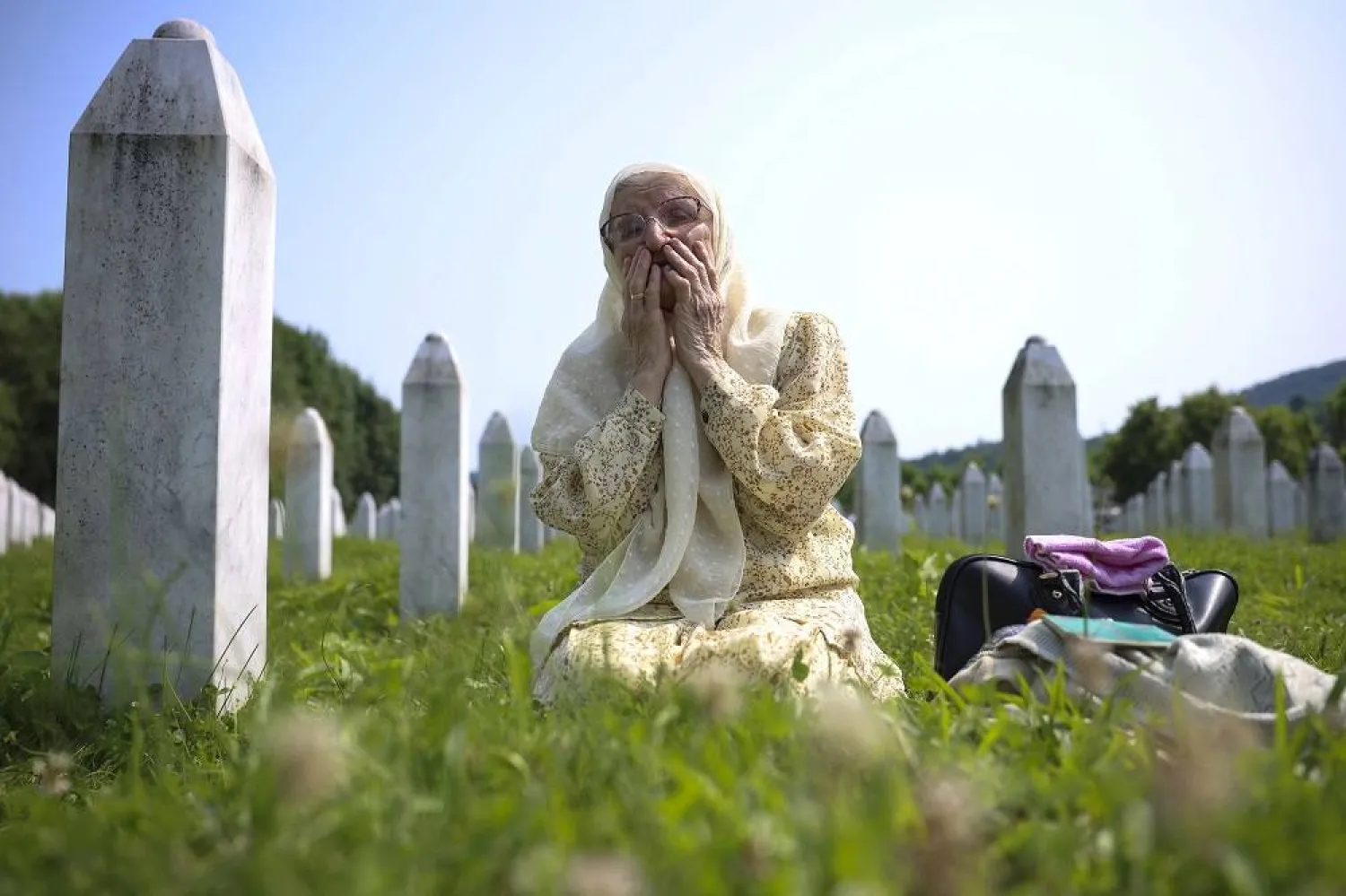Tens of thousands of people from around Bosnia and abroad gathered in Srebrenica Tuesday for the annual ritual of commemorating the 1995 massacre and to give a dignified burial to the victims unearthed from mass graves and only recently identified through DNA analysis.
Twenty-eight years after they were murdered in Europe’s only acknowledged genocide since the Holocaust, 27 men and three teenage boys were laid to rest Tuesday at a vast and ever-expanding memorial cemetery just outside Srebrenica, in eastern Bosnia, joining more than 6,600 massacre victims already reburied there.
Relatives of the victims can bury only partial remains of their loved ones as they are typically found scattered over several different mass graves, sometimes miles (kilometers) apart. Such was the case of Mirsada Merdzic, who buried her father on Tuesday.
“Only a very few bones of his were retrieved because he had been found (in a mass grave) near the Drina River,” she said while huddling next to a casket shrouded in a green burial cloth. “Maybe the river washed him away.”
Selma Ramic reburied a handful of her father's bones several years ago, but still returns to the town for the anniversary to honor others who shared his fate.
“One photo is the only thing I have left of my father, but I have love for him in my heart,” said Ramic, adding: “He still lives in us. He will live on as long as we are alive.”
The Srebrenica killings were the bloody crescendo of Bosnia’s 1992-95 war, which came after the breakup of Yugoslavia unleashed nationalist passions and territorial ambitions that set Bosnian Serbs against the country’s two other main ethnic populations — Croats and Bosniaks.
On July 11, 1995, Bosnian Serbs overran a UN-protected safe area in Srebrenica. They separated at least 8,000 Muslim Bosniak men and boys from their wives, mothers and sisters and slaughtered them. Those who tried to escape were chased through the woods and over the mountains around the ill-fated town.
The perpetrators then plowed their victims’ bodies into hastily made mass graves, which they later dug up with bulldozers, scattering the remains among other burial sites to hide the evidence of their war crimes.
The Bosnian Serb wartime political leader Radovan Karadzic and his military commander Ratko Mladic were both convicted of genocide in Srebrenica by a special UN war crimes tribunal in The Hague. In all, the tribunal and courts in the Balkans have sentenced close to 50 Bosnian Serb wartime officials to more than 700 years in prison for the Srebrenica killings.
However, most Serbian and Bosnian Serb officials still celebrate Karadzic and Mladic as national heroes. They continue to downplay or even deny the Srebrenica killings and offend the massacre victims and survivors.
Adding to decades of insults, the Bosnian Serb mayor of Srebrenica, Mladen Grujicic, last week publicly described the Mothers of Srebrenica organization — founded by female relatives of massacre victims to demand the exhumation of mass graves and the dignified reburial of their loved ones — as “an engine of hate.”
“We are very sad and we will always be sad,” said Mevlija Sabanovic on Tuesday, after burying a cousin who was just 15 when he was killed.
“We are being humiliated constantly and that is not right. We must find a way to live together,” she added.
Since the end of the war, Srebrenica has been located in the Serb-run Bosnian entity of Republika Srpska, while many of its pre-war inhabitants live in the country’s other entity, the Bosniak-Croat Federation. The two entities — linked by shared, state-wide institutions — were created by the 1995 US-brokered Dayton peace accord that ended the Bosnian war.
Bosnian Serb leaders have never given up on the desire to separate their mini-state from the rest of the country. Stirring fears of a new conflict, in recent weeks they have stepped up their campaign by passing laws rejecting the authority in their territory of Bosnia’s multi-ethnic Constitutional Court and the top international overseer of the 1995 peace agreement, German politician Christian Schmidt.
The European Union’s top diplomat, Josep Borrell, and enlargement commissioner Oliver Varhelyi, however, used the occasion of the massacre anniversary to pledge to “defend peace and protect life” in Bosnia.
“Europe remembers its responsibility and failure to protect ... we vow to do better,” they said in a statement issued ahead of the commemoration ceremony.









